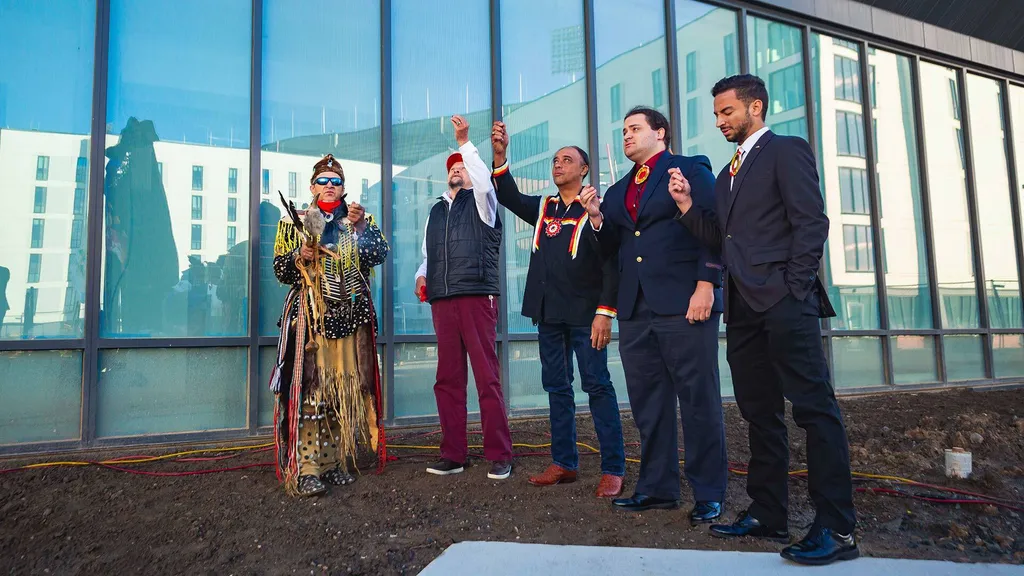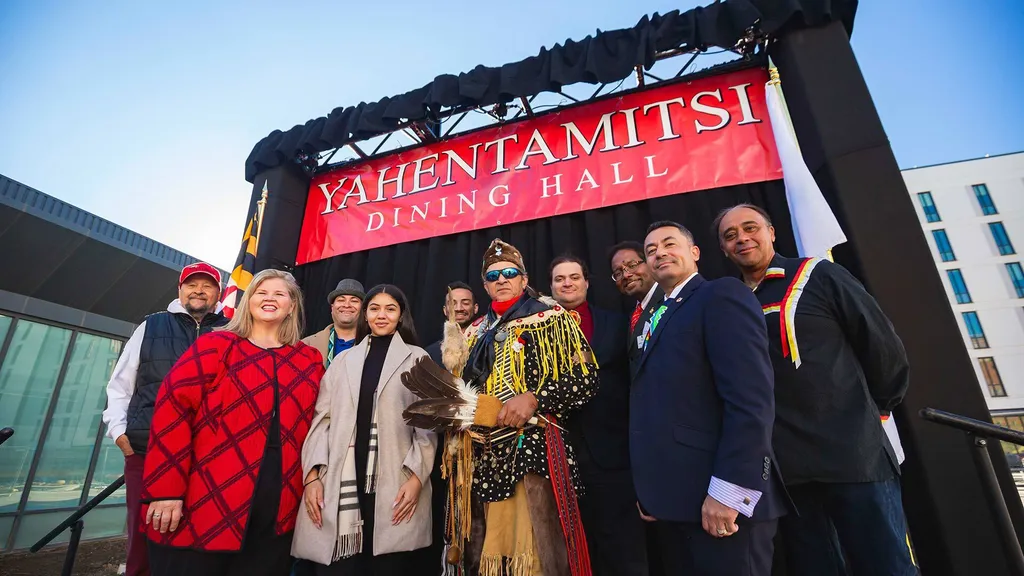- November 02, 2021
- By Karen Shih ’09
As burning sage perfumed the air on a crisp fall morning, campus, state and tribal leaders gathered yesterday to ceremonially bless the ground and announce the name of the University of Maryland’s first new dining hall in nearly 50 years.
It will be called “Yahentamitsi” (Yah-hen-tuh-meet-c), which means “a place to go to eat” in the Algonquian language spoken by the Piscataway, who are indigenous to Maryland, and will open in 2022.
“Today we have the opportunity to reimagine and to see what is familiar to us, but through Piscataway eyes. This campus has been here for a very long time—yet many of us were blind to its history,” said UMD President Darryll J. Pines. “As a land-grant institution, I believe it is our responsibility to record, to interpret and to raise public awareness about tribal history. This effort was long overdue.”
This is the first UMD building to be named for Maryland’s Native American heritage; it will feature art, artifacts and other educational materials from the Piscataway people, on whose ancestral lands the university stands today. The name was developed in partnership with Piscataway elders and tribal members, as well as UMD faculty, staff and students, including the American Indian Student Union (AISU).
“Having a beautiful place like this that is being represented and being honored for our ancestors, it means a whole lot,” said AISU treasurer Jeremy Harley ’23, a member of the Piscataway Conoy tribe. “It makes me feel like I have a space here on campus that I can truly say this represents myself, this represents my people, this represents my family.”
Yahentamitsi is part of the new Heritage Community, which includes Pyon-Chen Hall, which opened in August, and Johnson-Whittle Hall, which like the dining hall will open in 2022. Each building’s name honors people and cultures from the university’s history, part of Pines’ TerrapinSTRONG initiative to acknowledge UMD’s past and create a more inclusive community.
The name unveiling was held at the start of Native American Indigenous Heritage Month, and also featured the ground blessing by Maurice Proctor, a member of the Piscataway Conoy Tribe. He burned a combination of tobacco, sage and sweet grass, representing the sacred belief that smoke carries prayers for respect, safety and protection up to the creator.
In addition, Troy Richardson of the Haliwa-Saponi Tribe performed traditional calling, honor and memorial songs; E. Keith Colston spoke on behalf of Maryland Governor’s Office of Community Initiatives, where he serves as director of ethnic commissions; and Rico Newman, a Piscataway Conoy tribe member, offered a land acknowledgment.
“We, the Piscataway people, are honored and with heartfelt gratitude, salute the University of Maryland’s leadership, both as professors and students, in memorializing on our ancestral homeland with this newly constructed building that will bear our name in perpetuity,” said Newman. “We thank you all and look forward to a future where we together build a beneficial and productive relationship with this university. With my heart, I shake all of your hands.”

From left: Piscataway Conoy Tribe members Maurice Proctor, Rico Newman, tribal chairman Francis Gray, Brandon "Kota" Harley '19 and Jeremy Harley '23, participate in the ground blessing for the Yahentamitsi dining hall, currently under construction. (Photo by Stephanie S. Cordle)

Campus, state and tribal leaders gathered to unveil the new dining hall name on the first day of Native American Indigenous Heritage Month. (Photo by Stephanie S. Cordle)
Yahentamitsi at a Glance:
- 60,000+ square feet
- 1,000 seats
- LEED Silver-certified
- 11 major food stations
- Dining balcony overlooking Maryland Stadium and adjacent practice fields
- Gender-neutral restrooms
- Staff locker rooms
- Art, artifacts and other educational materials from the Piscataway people
Topics
Campus & Community